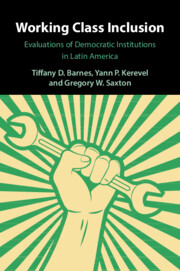
-
Select format
-
- Publisher:
- Cambridge University Press
- Publication date:
- October 2023
- November 2023
- ISBN:
- 9781009349833
- 9781009349819
- 9781009349802
- Dimensions:
- (229 x 152 mm)
- Weight & Pages:
- 0.55kg, 266 Pages
- Dimensions:
- (229 x 152 mm)
- Weight & Pages:
- 0.42kg, 266 Pages
You may already have access via personal or institutional login
Book description
Latin American legislators, like legislators worldwide, are drawn from a narrow set of elites who are largely out of touch with average citizens. Despite comprising the vast majority of the labor force, working-class people represent a small slice of the legislature. Working Class Inclusion examines how the near exclusion of working-class citizens from legislatures affects citizens' evaluations of government. Combining surveys from across Latin America with novel data on legislators' class backgrounds and experiments from Argentina and Mexico, the book demonstrates voters want more workers in office, and when combined with policy representation, the presence of working-class legislators improves citizens' evaluations of government. Absent policy representation, however, workers are met with distrust and backlash. Chapters show citizens have many opportunities to learn about the presence, or absence, of workers; and the relationship between working-class representation and evaluations of government is strongest among citizens who are aware of legislators' class status.
Awards
Co-Winner, 2024 Class and Inequality Best Book Award, American Political Science Association
Winner, 2024 Richard F. Fenno Jr. Prize, Legislative Studies Section, American Political Science Association
Reviews
‘A major landmark for the study of labour politics.’
Christopher Chambers-Ju Source: Journal of Latin American Studies
Contents
Metrics
Altmetric attention score
Full text views
Full text views help Loading metrics...
Loading metrics...
* Views captured on Cambridge Core between #date#. This data will be updated every 24 hours.
Usage data cannot currently be displayed.
Accessibility standard: Unknown
Why this information is here
This section outlines the accessibility features of this content - including support for screen readers, full keyboard navigation and high-contrast display options. This may not be relevant for you.
Accessibility Information
Accessibility compliance for the PDF of this book is currently unknown and may be updated in the future.


